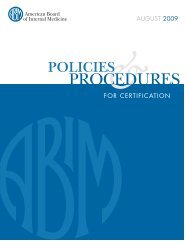The SRA Symposium - College of Medicine
The SRA Symposium - College of Medicine
The SRA Symposium - College of Medicine
Create successful ePaper yourself
Turn your PDF publications into a flip-book with our unique Google optimized e-Paper software.
Papers<br />
Brent: Karl has been a great friend to me, my family, and all those with whom he has interacted<br />
at the Naval Medical Research Center. He put forth the effort to talk and become friends with as<br />
many <strong>of</strong> the people around him as possible. I invited him over for dinner a few times, and my family<br />
and I enjoyed his company. It is much easier to be a mentor to someone who is genuinely your<br />
friend.<br />
Good Listening Skills. In any productive relationship, good communication is key. <strong>The</strong> mentor<br />
should be a good listener, never being bound to his or her perspective by misjudging or misinterpreting<br />
the trainee. A mentor should always listen to exactly what the trainee is trying to say,<br />
not what the mentor expects or wishes to hear. <strong>The</strong> mentor should pay attention to the “subtext”<br />
<strong>of</strong> the trainee’s words, including his or her tone, attitude, and body language. When the trainee<br />
believes to have understood a point, it is helpful to repeat it back to the mentor, making sure this<br />
understanding is correct. <strong>The</strong> same principles <strong>of</strong> good listening for the mentor should be applied<br />
to the trainee. Effective communication, requiring good listening skills, is essential to a productive<br />
mentor/trainee relationship.<br />
Karl: Dr. House’s ability to listen was one <strong>of</strong> the factors that contributed most to my experience<br />
here. Dr. House never interrupted me when I was talking. Moreover, he never unduly persuaded<br />
me to adopt his opinion - this was very helpful for me, because I could learn more and was not<br />
bound by unnecessary limits. Our listening-based communication was a keystone for my project,<br />
especially at the beginning when most <strong>of</strong> my time was spent reading and asking questions.<br />
Brent: Good communication is fundamental in a mentor/trainee relationship. During Karl’s stay<br />
here, I always felt that he listened well to instructions and training given to him. For example, each<br />
morning we would discuss the previous day’s results and the upcoming projects. At each <strong>of</strong> these<br />
discussion sessions, I would give him instructions for the day’s work. He would almost always do<br />
what was discussed – and if he was confused about one thing or another, he would immediately<br />
come and talk to me about it.<br />
<strong>The</strong> Mentor’s Responsibilities<br />
Be Available. <strong>The</strong> mentor should make himself available to the trainee. Too many scientists-intraining<br />
are left to their own devices during the crucial initial phases <strong>of</strong> their careers, because<br />
mentors are very busy and may not be able to reserve large blocks <strong>of</strong> time for the trainee. But<br />
through effective communication, and a solid commitment from the mentor, time can be made<br />
available for training. <strong>The</strong> mentor should also keep in mind that some students require more time<br />
than others. It might be quite possible for some, more talented and/or experienced scientists to<br />
just “check in” once or twice a week. But some students will require, especially in the beginning, a<br />
larger portion <strong>of</strong> the mentor’s time. In any case, the mentor should not forget his or her trainee(s)<br />
and should arrange times for weekly or even daily meetings.<br />
Karl: To read as much as possible and to learn the theoretical side about molecular biology was<br />
one <strong>of</strong> my objectives during this internship; therefore I read a lot in the first few weeks in order to<br />
understand the work that I would be doing in the lab. During this reading time, my mentor was<br />
always available if I had questions. This was great since none <strong>of</strong> my objectives could have been<br />
accomplished if Dr. House had been unavailable. Dr. House, in order to make sure that I understood<br />
the material well, was spending even more time talking about the material than I needed.<br />
Throughout the laboratory exercises, Dr. House was almost always available if I needed him as<br />
well.<br />
38 2005 <strong>Symposium</strong> Proceedings Book

















